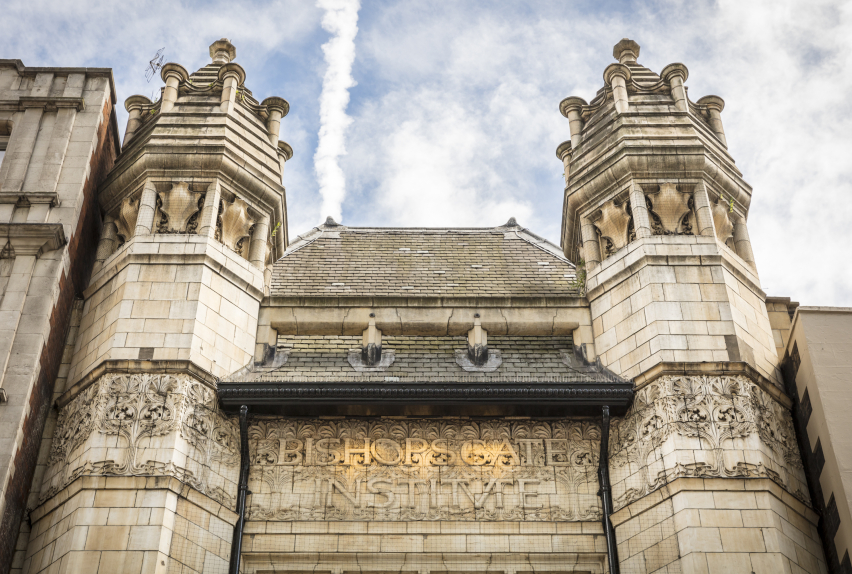
Writing Sexual Subcultures Workshops
Join one or all three of these workshops that will be using material from the UK Fetish Archive held at Bishopsgate Institute.
Who are these workshops for?
Anyone with an interest in sex, kink, sexuality, writing, LGBTQ+ studies
Will I need any equipment or materials?
All materials will be provided
Do I need previous experience or skills?
These workshops are open to all levels of ability, writing styles and identities.
See below for more detailed descriptions of each workshop.
Practical Information
- This workshop will take place in person at Bishopsgate Institute in the Courtyard Room.
- Tickets are bookable online until 2 hours before the workshop begins. If the workshop is not sold out, tickets will be available on the door at the box office, subject to availability. Please call the box office on 020 7392 9200 or email enquiries@bishopsgate.org.uk for more information.
- If you have any accessibility needs or concerns please email us at enquiries@bishopsgate.org.uk.
Need to Know
Metadata
- Price
- £19 / £11 / £19
- Duration
- 120
- Venue
- Bishopsgate Institute
- Tutor
- Matt Skully
- Max Students
- 50
Meet the Tutor
Matt Skully
Matt Skully is a London-based kink practitioner, multidisciplinary artist and writer whose work explores the erotic, the taboo, and the beautifully perverse. Rooted in fetish culture, his practice spans live performance, events, writing, photography and his curation work has brought together kink-positive artists, performers and thinkers, creating platforms for dialogue between sex work, art, and activism.
Workshop details
22/06 - Writing Sexual Subcultures
Target Audience: Writers, creatives, and curious minds interested in exploring sexuality
Workshop Description:
Sexual subcultures in kink, BDSM, polyamory, queer identities and fetish communities offer rich, complex terrains for storytelling. Yet, writing about these worlds with authenticity, sensitivity, and depth requires more than surface-level understanding.
Writing Sexual Subcultures is an exploratory, hands-on workshop designed to encourage participants to explore historical and contemporary written work. Through writing exercises, discussions, and readings, we’ll unpack how desire, identity, power, and intimacy function within marginalised sexual communities.
Whether you're writing erotica, memoir, speculative fiction or articles this workshop will challenge you to consider voice, tone, research, and representation in your work. Participants will also explore how their own perspectives and experiences intersect with the communities they write about.
What We’ll Explore:
- Drawing on sources that explore sex
- Writing styles and why we should all be writing about our experiences
- Language, tone, politics and audience
- Navigating power dynamics in storytelling
- LGBTQ+ voices and documentation
13/07 - Writing Sexual Subcultures: Blurring Fact and Fiction
Audience: Writers, artists, creatives and readers interested in hybrid storytelling and sexual countercultures
Workshop Description:
Sexual subcultures have always thrived in the margins—hidden in diaries, cloaked in fiction, coded in memoirs, and spread through underground zines. In these spaces, the line between truth and invention often blurs. This workshop explores how writers have historically and contemporarily used hybrid forms—mixing fact and fiction—to capture the complexity of desire, identity, and community in sexual subcultures.
Drawing from a wide range of texts including erotic confessionals, speculative memoirs, and queer theory, Writing Sexual Subcultures: Blurring Fact and Fiction invites participants to read and write across boundaries. We’ll look at how historical figures fictionalised their lives to protect themselves (or their subjects), how contemporary authors play with genre to push political and personal boundaries, and how the act of blending truth with invention can serve as a form of liberation, survival, and resistance.
What We’ll Explore:
- Techniques for mixing memoir, archival material, and fictional elements
- How authors navigate identity, anonymity, and representation
- Ethical questions around writing real communities through fictional forms
- The role of voice, fragmentation, and subversion in hybrid narratives
- Writing exercises to experiment with form, truth, and storytelling
10/08 - Writing Sexual Subcultures: Sex Work
Audience: Writers, sex workers, artists, students, and readers interested in the politics and poetics of sex work in literature
Workshop Description:
Sex workers have long been central figures in literature—written about, mythologized, silenced, and criminalised. But when sex workers write themselves into history—through memoirs, fiction, poetry, and hybrid forms—the result is a radical reshaping of narrative power. This workshop explores how sex workers and their allies have used the blurred space between fact and fiction to reclaim voice, challenge stigma, and document lived experience.
Focusing on historical and contemporary texts by and about sex workers, Writing Sexual Subcultures: Sex Work, invites participants to engage with writing that resists binary thinking—about genre, morality, and identity.
We’ll Explore:
- Writing as survival: memoir, zines, and speculative truth
- The politics of representing sex work: voice, consent, anonymity, and audience
- Reviews, self promotion and establishment of services
- Exercises to create new work that draws from lived experience, historical research, and imaginative possibility
